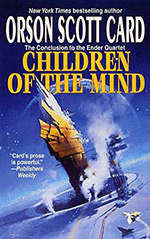
![]() verkisto
verkisto
7/26/2016
![]()
It's been interesting to see the development of this series over the last three books. Ender's Game is a different sort of book than any of the remaining books in the quartet, since it's more focused on action, while the last three books are more philosophical in nature. Children of the Mind picks up right from the point where Xenocide finishes, and, like Xenocide, is about identity amidst our personal and cultural history. This makes sense (according to Card's afterword, this book was initially a part of Xenocide), but where each other book in the series has its own distinctive theme, Children of the Mind feels like a continuation.
Again, this isn't a bad thing, and it makes sense based on Card's notes, but it just lacked some of the oomph that Xenocide had. At one point in the book, there was a palpable tension to the story where it seemed like one of the main characters wouldn't survive, but the thematic elements, and the significance of the events, didn't feel as important as they had been in previous books. Part of it, I think, was Card striving to wrap everything up neatly, with the right people ending up together, and all the main characters surviving and finding a solution to their problems. A little ambiguity, I think, would have been effective, as well as something to keep it from being such a happy-happy ending. In the end, it felt like there was no real sacrifice made by the characters (or, when there was, it didn't seem to affect them very long), and everyone wound up with what they wanted. It felt a little odd after reading the previous books.
Also, I felt like the characterization was weaker in this novel than it had been in the previous books. Peter changed from being the character from Xenocide to being someone altogether different; Wang-Mu goes from being a strong, thoughtful woman to someone who's insecure and lovesick; and Quara ... well, she didn't really change, other than the fact that Card makes her as unlikable as possible without making her a villain. Even established characters like Ender wind up feeling very two-dimensional, and I can't help but feel like Card was counting too much on the reader already being familiar with the characters and their backgrounds. From Speaker for the Dead to Xenocide, 30 years had passed, and Card had the opportunity to update their personalities and motivations; from Xenocide to Children of the Mind, only about two minutes passed, and I guess he forgot to build up his characters enough to make them real.
The story is still compelling, and I think anyone who finishes Xenocide will want to continue with this novel. I just think it would be irresponsible to recommend this without some hesitation. It's not nearly on the level as the rest of the series.